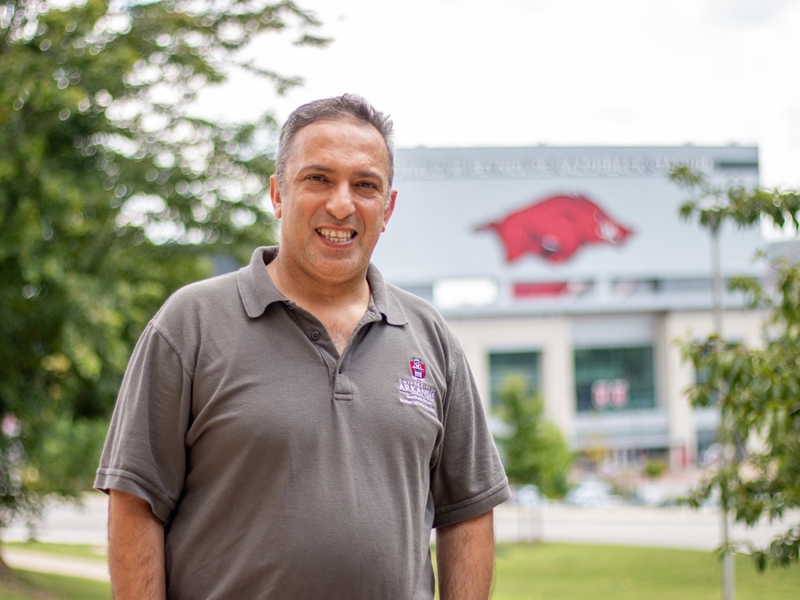Graduate and international education is all about discoveries — the discovery of knowledge, the discovery of research and creative scholarship that improves lives, and the discovery of new countries, cultures and people. The Graduate School and International Education is celebrating our students, faculty and staff that make discoveries happen at the University of Arkansas.
Adnan Alrubaye's passion for chickens began when he was a child growing up in southern Iraq, where he raised chickens to help provide eggs and meat for his family.
That experience made Alrubaye realize the importance of poultry as a food source, an epiphany that led him to the U of A. His time at the U of A has included numerous titles: student, alumnus, then faculty member and associate director of the Cell and Molecular Biology Program, one of the largest graduate programs on campus. But he's also an advocate, working to create a more welcoming and inclusive campus community for international students.
From an early age, Alrubaye's parents instilled in him the belief of the power of education and its importance for personal growth and the betterment of society.
"They encouraged me to pursue learning opportunities both inside and outside of the classroom, and they provided support and guidance throughout my educational journey," he said. "As a result, I've come to appreciate the transformative power of education and recognize its role in shaping my future."
Alrubaye attended veterinary school in 2000, graduating first in his class out of more than 220 students. He decided to continue his education at the College of Medicine at the University of Baghdad, finishing his master's degree in medical microbiology in 2003 just 10 days before the start of the 2003 war.
But he wanted to pursue his Ph.D. in the United States, as the country's higher education system was "known worldwide for academic excellence, research opportunities, cultural diversity and lifelong learning opportunities." When considering where to pursue a doctoral degree in the U.S., Alrubaye spoke with a colleague at the RTI International, U.S. State Agency for International Development (USAID) who was from Arkansas and an alumnus of the Dale Bumpers College of Agricultural, Food and Life Sciences. He recommended the U of A to Alrubaye.
As a graduate student in the Poultry Science Program, Alrubaye homed in on research into mitigating diseases in chickens — specifically chicken lameness and pulmonary hypertension syndrome — to help make more chickens available as a food source. His research has helped identify feed additives to improve gut health, immune function and reduce lameness, and he is currently working to develop a vaccine against lameness as well that could save the poultry industry tens of millions of dollars per year.
"Chicken is the number one animal protein worldwide, and we produce 1 billion birds per year here in Arkansas," he said. "My interest is not just simply helping the poultry industry produce more birds, but also producing healthier birds."
After graduating with his doctorate, Alrubaye remained at the U of A, beginning as an instructor of biological sciences and an associate director of the interdisciplinary Cell and Molecular Biology Program in the Graduate School and International Education. Now, he's an assistant professor of poultry microbiology in Bumpers College, teaches general microbiology in the Fulbright College of Arts and Sciences and continues to serve as associate director in the Cell and Molecular Biology Program. He also conducts research with the U of A System Division of Agriculture.
"There are so many people in the Graduate School and International Education who were helpful when I was a student," he said. "The people here were so friendly. Usually, when people finish a degree, they decide to go work somewhere else, but we liked it so much that we decided to stay in Fayetteville."
He was hired in the Cell and Molecular Biology Program in part to help recruit more international students from Arabic-speaking countries. Alrubaye worked closely with program head Doug Rhoads to grow enrollment in cell and molecular biology from around 50 students a decade ago to more than 100 now, earning it a spot as one of the largest doctoral programs on campus. Around three-quarters of those students are international.
Alrubaye has also led several initiatives to help the international community feel more welcome at the university. He co-chairs the Scholars at Risk Committee, which brings international faculty members to campus to discuss their research; established an International Employee Impact Group; and worked with Chartwell's on campus to diversify dining options for students to include Halal food.
"I think the needs of international students are different," he said. "If you grew up here, you have a support system — you have relatives and friends to ask for help. When you're an international student, you don't have that, and there are so many difficulties. I wanted to help make that transition easier for them."
When Alrubaye reflects on his time at the university, he sees the impact he and others in the international community have made to improve campus.
"I always work by the slogan, 'I cannot go back and change the past, but I can start today to change the future,'" he said. "I'm happy where I am today, but I'm not satisfied. I'll continue to develop more initiatives and support international faculty, staff and students, having been through this route myself as a student and a faculty."
"I'm familiar with these issues, and I want to make it easier for international students and faculty to live a better life here on campus," he continued. "I consider this university as my home. I don't have family in the U.S. besides my wife and kids. This is my life, my family and my home. And my goal is to make this a better home for everyone on this campus."
Topics
Contacts
John Post, director of communications
Graduate School and International Education
479-575-4853,
